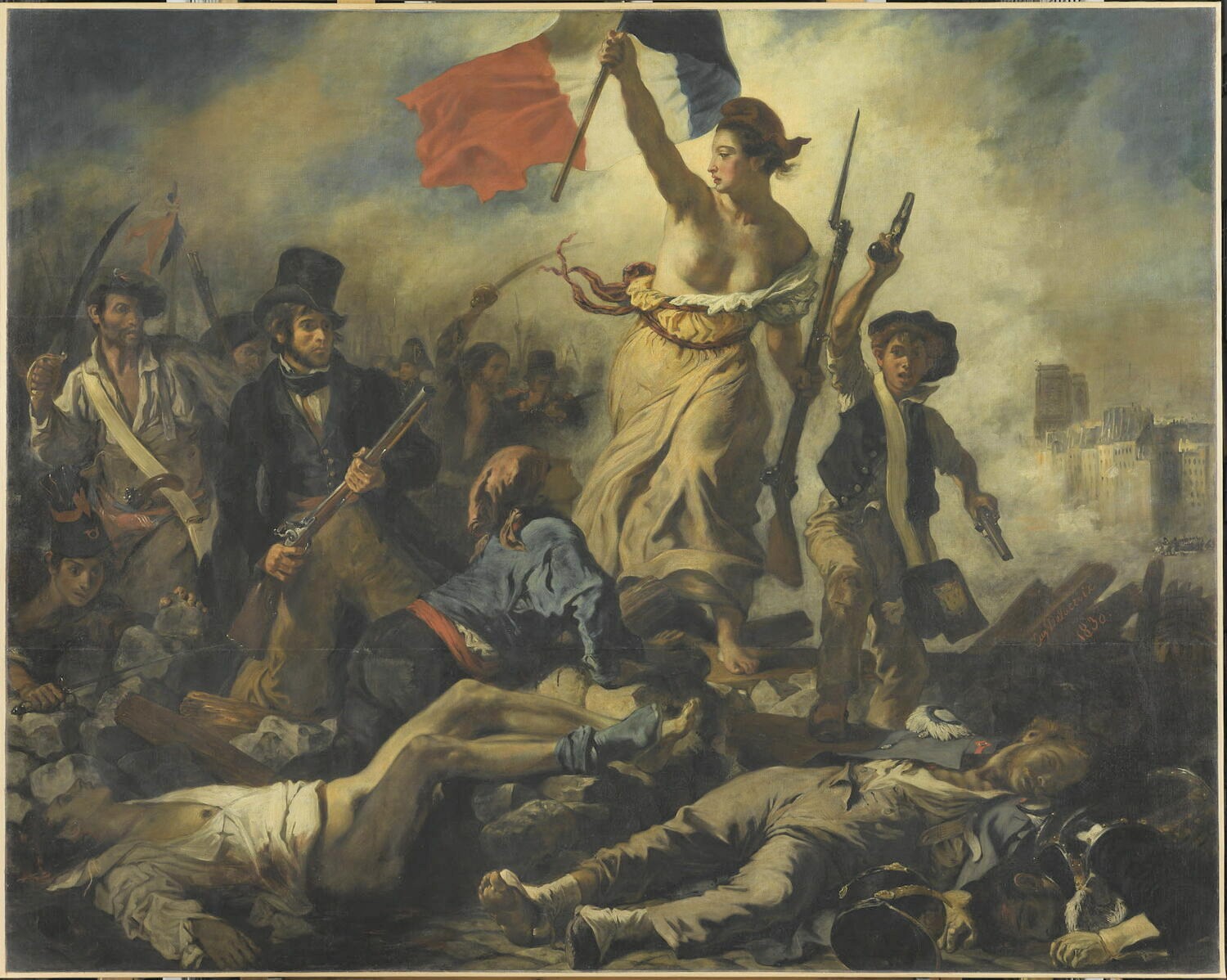+39 0669887260 | info@wucwo.org | Contact us
Art for meditation - October 2024
Eugène Delacroix (Charenton-Saint-Maurice 1798 - Paris 1863), Liberty Leading the People, 1830, oil on canvas, 360 x 325 cm, Paris, Musée du Louvre
The Virtues: Liberty.
Eugène Delacroix's famous painting takes its cue from an event that really took place: in July 1830, from the 27th to the 29th, the people of Paris rebelled against the government that King Charles X had set up the year before. They made barricades and forced the king to dismiss the government, cancel the liberticidal laws that had been enacted and finally abdicate by fleeing to England.
There are many realistic elements in the painting, but we are particularly struck by the portraits of the citizens who took up arms and rebelled: there are people of all ages and social classes. On the right we find a young boy armed with pistols, as if symbolising the courage and struggle of young people against the injustice of absolute monarchy. To the left, on the other hand, we can clearly see a bourgeois intellectual with an elegant top hat on his head and a shotgun in his hand. Then, in the centre, we find a young labourer kneeling in her leather apron, gazing full of hope at the figure standing tall in the centre of the painting. In the background, to the right, beyond the dust, stand the two medieval towers of Notre-Dame cathedral and this detail places the scene exactly in Paris. The drama of the moment is underlined by the corpses: we count three, on the left a young insurgent, on the right a cuirassier and a Swiss guard, who were part of the royal guard.
But now let us focus our gaze on the centre of the painting, specifically on the young woman leading the people with the French tricolour flag in her right hand and a rifle in her left. She is the allegorical figure of Liberty, wearing a Phrygian cap that immediately recalls the values of the 1789 revolution. She has bare breasts and bare feet, as if to emphasise that the strength of a people fighting against injustice lies essentially in their convictions and courage. She has placed herself at the head of the insurrection, she is not afraid and in fact encourages and leads the people. Her clothes and hair are moved by an impetuous wind, which we cannot tell whether it is the atmospheric agent or rather something inner that comes out of the figure itself and causes an intense movement.
Liberty is thus a young woman leading a people made up of men, and in a way, that too was a revolution. It is a symbol, of course, but it is placed in a concrete context where it has had important consequences. Not only has it led to the repeal of unjust laws, but it has even caused a king to abdicate and flee!
So he sent them this message: "King Demetrius sends greetings to the Jewish nation…. Every one of the Jews who has been carried into captivity from the land of Judah into any part of my kingdom I set at liberty without ransom; and let all their taxes, even those on their cattle, be canceled. (Maccabees 10,25;33)
The spirit of the Lord GOD is upon me, because the LORD has anointed me; He has sent me to bring glad tidings to the lowly, to heal the brokenhearted, To proclaim liberty to the captives and release to the prisoners. (Isaiah 61, 1)
Therefore, thus says the LORD: You did not obey me by proclaiming your neighbors and kinsmen free. I now proclaim you free, says the LORD, for the sword, famine, and pestilence. I will make you an object of horror to all the kingdoms of the earth. (Jeremiah 34, 17)
For creation awaits with eager expectation the revelation of the children of God; for creation was made subject to futility, not of its own accord but because of the one who subjected it, in hope that creation itself would be set free from slavery to corruption and share in the glorious freedom of the children of God. (Romans 8, 19-21)
Now the Lord is the Spirit, and where the Spirit of the Lord is, there is freedom. All of us, gazing with unveiled face on the glory of the Lord, are being transformed into the same image from glory to glory, as from the Lord who is the Spirit. (2 Corinthians 3, 17-18)
Or you were called for freedom, brothers. But do not use this freedom as an opportunity for the flesh; rather, serve one another through love. For the whole law is fulfilled in one statement, namely, "You shall love your neighbor as yourself." (Galatians 5, 13-14)
So speak and so act as people who will be judged by the law of freedom. For the judgment is merciless to one who has not shown mercy; mercy triumphs over judgment. (James 2, 12-13)
(Contribution by Vito Pongolini)
